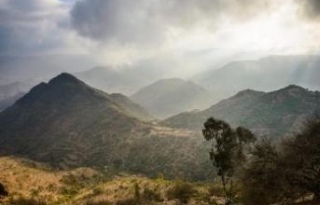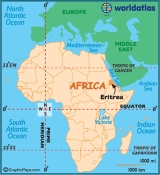|
|
|
Eritrea, officially the State of Eritrea, is a country in the Horn of Africa, with its capital at Asmara. It is bordered by Sudan in the west, Ethiopia in the south, and Djibouti in the southeast. The northeastern and eastern parts of Eritrea have an extensive coastline along the Red Sea. The nation's total area includes the Dahlak Archipelago and several of the Hanish Islands. Its toponym Eritrea is based on the Greek name for the Red Sea (Erythra Thalassa), which was first adopted for Italian Eritrea in 1890.
- Profiles
- Gender and Land
- Land and Conflict
- Land and Investment
- Land and Rural Development
- Land and Urbanization
- Land Laws and Policies
Gender and Land
In 2005, the estimated population was 4 401 000 people, of which 2 241 000 were female and 2 161 000 were male. In 2005, the national population density averaged 29 people per square kilometer; however, in the highlands, density reached 200 people per square kilometer. In the same year, 3 485 000 people lived in rural areas, while 916 000 lived in urban areas.In 2005, the estimated population was 4 401 000 people, of which 2 241 000 were female and 2 161 000 were male. In 2005, the national population density averaged 29 people per square kilometer; however, in the highlands, density reached 200 people per square kilometer. In the same year, 3 485 000 people lived in rural areas, while 916 000 lived in urban areas.
The population is culturally and linguistically diverse, consisting of nine ethnic groups: Tigrigna account for 50 percent of the total population, Tigre and Kunama for 40 percent, Afar for 4 percent, Saho for 3 percent and Hidareb, Bilen, Nara and Rashaida for the remaining share.
folder R ead more on folder Gender and Land ...
Land and Conflict
The almost five-year old border stalemate between Ethiopia and Eritrea has become untenable and the stakes are now much higher that they were a year ago. This came about after Eritrea undertook a series of “high risk” measures, including a ban on UNMEE (United Nations Mission in Ethiopia and Eritrea) helicopter flights, expulsion of UNMEE personnel of certain nationalities, expulsion of various relief agencies, and so forth. Likewise at home, Eritrea has taken and continues to take various measures that have seriously and negatively affected the human rights of its citizens. These include the indefinite detention of PFDJ (People’s Front for Democracy and Justice) dissidents, journalists, and others deemed threats to national security. Over the last two years, in particular, the government clampdown on members of “official” as well as “non-official minority” faiths, draft evaders, and army deserters has dramatically increased. The Government of Eritrea has thus moved away from the “cautious authoritarianism” of the pre-1997 years in the direction of what may be referred to as “fully-fledged authoritarianism” after the border war.
folder R ead more on folder Land and Conflict ...
Land and Investment
We discuss energy efficiency and renewable energy investments in Eritrea from the strategic long-term economic perspective of meeting Eritrea's sustainable development goals and reducing greenhouse gas emissions. Energy efficiency and renewable energy are potentially important contributors to national productive capital accumulation, enhancement of the environment, expansion of energy services, increases in household standard of living, and improvements in health. In this study we develop a spreadsheet model for calculating some of the national benefits and costs of different levels of investment in energy efficiency and renewable energy. We then present the results of the model in terms of investment demand and investment scenario curves. These curves express the contribution that efficiency and renewable energy projects can make in terms of reduced energy sector operating expenses, and reduced carbon emissions. We provide demand and supply curves that show the rate of return, the cost of carbon emissions reductions vs. supply, and the evolution of the marginal carbon emissions per dollar of GDP for different investment levels and different fuel-type subsectors.
folder R ead more on folder Land and Investment ...
Land and Rural Development
The Government of the State of Eritrea, in its national development policy and strategy, has recognized and addressed the importance of sustainable water resources management and increasing water use efficiency for livelihoods and sustainable development of the country aimed at promoting rapid economic growth and poverty reduction.
folder R ead more on folder Land and Rural Development ...
Land and Urbanization
This paper uses data from rural Eritrea to assess the effect of endowments in non-land factors of production on land-renting behavior of farm households and to test for transaction costs of adjustment in the land rental market. A two-stage approach for participation in the market as landlords or tenants is used for analysis. Results show the importance of the land rental market for adjustment to non- or semi-tradable non-land household endowments. There were indications of significantly higher transaction costs faced by potential tenants than by potential landlords.
folder R ead more on folder Land and Urbanization ...
Land Laws and Policies
We the people of Eritrea, united in a common struggle for our rights and common destiny, standing on the solid ground of unity and justice bequeathed by our martyrs and combatants: With Eternal Gratitude to the scores of thousands of our martyrs who sacrificed their lives for the causes of our rights and independence, during the long and heroic revolutionary struggle for liberation, and to the courage and steadfastness of our Eritrean patriots;
Aware that it is the sacred duty of all Eritreans to build a strong and developed Eritrea on the bases of freedom, unity, peace, stability and security achieved through the long struggle of all Eritreans, which tradition we must cherish, preserve and develop; Realising that in order to build a developed country, it is necessary that the unity, equality, love for truth and justice, self-reliance, and hard work, which we nurtured during our revolutionary struggle for independence and which helped us to triumph, must become the core of our national values; Appreciating the fact that for the development and health of our society, it is necessary that we inherit and improve upon the traditional community-based assistance and fraternity, love for family, respect for elders, mutual respect and consideration;
Convinced that the recognition, protection and securing of the rights and freedoms of citizens, human dignity, equality will guarantee a balanced development; lay down the groundwork for satisfying the material and spiritual needs of citizens; usher in a democratic order that is responsive to the needs and interests of citizens, guarantees their participation and brings about economic development, social progress and harmony;
Noting the fact that the Eritrean women's heroic participation in the struggle for independence and solidarity based on equality and mutual respect generated by such struggle will serve as an unshakable foundation for our commitment and struggle to create a society in which women and men shall interact on the bases of mutual respect, fraternity and equality;
Desirous that the Constitution we are adopting will be a covenant between us and the government we will be structuring by our free will and serve as a means for governing in harmony this and the future generation; and for bringing about justice and peace, founded on democracy, national unity and the rule of law;
today, on this historic date, after active popular participation, approve and solemnly ratify officially, through the Constituent Assembly, this Constitution as the fundamental law of our Sovereign and Independent State of Eritrea.
folder R ead more on folder Land Laws and Policies ...



